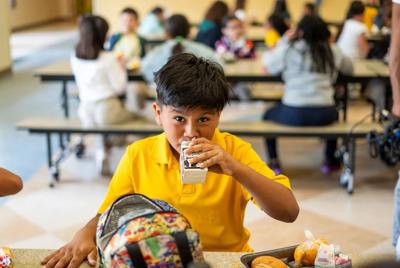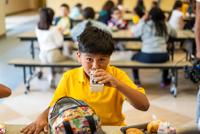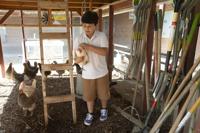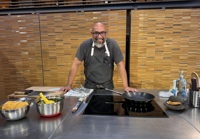
(No Kid Hungry)
One in three Latino families worry about putting food on the table, according to a No Kid Hungry report about the return to school.
According to new research from No Kid Hungry, the return to school, and the free and reduced-price meal programs that come with it are critical for families across the board, including Latino parents and caregivers navigating rising food costs and a challenging job market.
Some of the respondents from California said they were hopeful they could still qualify for free or reduced lunch as they prepare for the upcoming school year.
Another person responded they are “very worried since they are cutting education programs my child needs.”
“Our family is not prepared for the upcoming school year because prices have gone up so much and with three kids in school needing different new school supplies, food and snacks it’s a lot of financial stress on our family,” one of the parents said.
“I want them to be able to focus on learning not how hungry they are,” was another response to their concerns about the start of the school year.
Nationally, four in 10 parents say their financial situation is worse than last year. This is even harder among Latino parents surveyed, 34% reported a job loss in their household, and 42% said their family’s financial situation has worsened over the past year.
This, coupled with high grocery prices, means more than one-third worried about running out of food during the summer break, and 39% had to make tough trade-offs, such as paying an emergency bill instead of buying healthy groceries.
For Latino kids, back-to-school means reliable meals that help them learn and thrive.
A Latino parent explained the stakes clearly: “My son would possibly go hungry at school because we don’t have the income to buy the school meals and that would impact his ability to focus.”
77% of Latino parents say their children have trouble concentrating when they are hungry, and
85% agree that school meals help their kids focus and do better in class.
Three out of five parents report that school meals motivate their children to attend school regularly and even increase participation in afterschool activities.
With more than half of parents worried about other back-to-school expenses like clothes and notebooks, and 67% worried that food prices will continue to rise throughout the year, school breakfast and lunch programs help ensure their children have nutritious food while in the classroom.
46% of parents say their children might not have food to eat at school on some days without these programs.
Another Latino parent shared how vital these meals are and how it benefits with quality family time: “My child would have a hard time with school and progressing in general… I would have to pick up more hours.”
More key survey findings are available here.
“Back-to-school is a time of hope for kids, but also a time of stress for many Latino families,” said George Kelemen, senior vice president of program partnerships, campaigns and advocacy at Share Our Strength. “When kids can count on the meals they receive at school, everyone benefits. It means more stability for hard-working parents who are managing the stresses of rising costs and living paycheck to paycheck. It means kids can grow up healthier, focus in the classroom and are more likely to graduate and escape the cycle of poverty. Stronger, smarter kids mean a stronger, smarter nation for us all.”















(0) comments
Welcome to the discussion.
Log In
Keep it Clean. Please avoid obscene, vulgar, lewd, racist or sexually-oriented language.
PLEASE TURN OFF YOUR CAPS LOCK.
Don't Threaten. Threats of harming another person will not be tolerated.
Be Truthful. Don't knowingly lie about anyone or anything.
Be Nice. No racism, sexism or any sort of -ism that is degrading to another person.
Be Proactive. Use the 'Report' link on each comment to let us know of abusive posts.
Share with Us. We'd love to hear eyewitness accounts, the history behind an article.